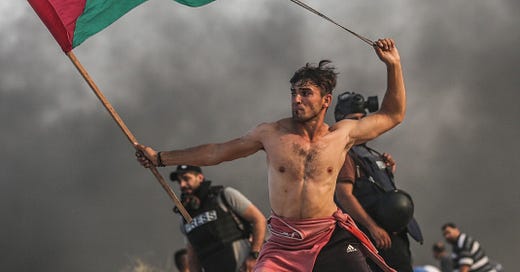Israel-Hamas War and the Breakdown of Israel-Russia Relations
Russia needs another Arab–Israeli War more than ever
The ongoing Israel-Hamas war destabilized the delicate equilibrium between Israel and Russia, despite the overblown Netanyahu-Putin friendship. To assess the risk of an escalation of the war into another Arab-Israeli war, one should revisit Israel’s tenuous relationship with Russia both in connection with its history and in the context of the Russo-Ukrainian war.
1. The Hamas attacks
Hamas’s terrorist attacks on Israel on October 7, 2023, resulted in over 1400 deaths, including Israeli civilians and foreign citizens. Not surprisingly, Russian President Vladimir Putin deplored the United States and its failed Middle East policy on 10 October, claiming that while seeking to monopolize the resolution of the Israeli-Palestinian conflict, the U.S. policy failed to take into account “the fundamental interests of the Palestinian people.”1
After Russia’s full-scale invasion of Ukraine on February 24, 2022, China also exploited the opportunity to inveigh the “dirty hands” of the United States for “fanning the flames to spark the Russo-Ukrainian conflict” (美國煽風點火挑動俄烏衝突).2 Analogous to China’s refusal to call the “Russo-Ukrainian conflict” an “invasion” or a “war,” Russia didn’t offer condolences to the victims of the terrorist attack nor did Kremlin condemn Hamas. Instead, Putin equated the Israeli siege of Gaza in an attempt to force Hamas to return the hostages, with the actions of the Nazis during the Leningrad blockade.3
The Wall Street Journal lamented that the Israel-Hamas war brought to an end the complex, cordial relations between Russia and Israel. The reaction of Russians is, however, reminiscent of the Soviet Union’s denunciation of Israel while deliberately overlooking the Syrian attacks on Israeli territory during the skirmish on April 7, 1967, two months before the “Six-Day War.”4 When Russians make such statements in favor of a third party, it is wrong to ignore their strategic purposes.
“Russia is interested in triggering a war in the Middle East, so that a new source of pain and suffering could undermine world unity, increase discord and contradictions, and thus help Russia destroy freedom in Europe,” said Ukrainian President Volodymyr Zelenskyy.5
“They [Russians] might exploit it [the Israel-Hamas war] because it will distract from Ukraine,” said Admiral Rob Bauer, NATO’s senior military officer. “The Israel-Hamas war has,” according to Foreign Policy, “given Moscow a priceless opportunity to turn the West’s eyes elsewhere, as well as a poisoned-chalice chance to reshape its entire approach to the Middle East.”6
Despite lack of “evidence that the Kremlin actually supplied Hamas or any other extremist group in Palestine with weapons, or that it took part in the planning of any of their operations,” commented Serbian political scientist and analyst Aleksandar Đokić, “it was uncovered that the Palestinian militants partially financed their operations by purchasing cryptocurrency in Russia in the lead-up to last Saturday's incursion and the resulting atrocities. Millions of dollars were funnelled through Garantex, a Moscow-based crypto exchange, to various extremist groups connected to Hamas.” Moreover, Hamas officials not only expressed their gratitude for Putin’s speech on the ongoing conflict, but also revealed that “Hamas has a license from Russia to locally produce bullets for Kalashnikovs, that Russia sympathises with Hamas, and that it is pleased with the war because it is easing American pressure on it with regard to the war in Ukraine.”7
Russians have sunk into the quagmire of war on Ukraine. Unlike the Soviet Union’s role behind Arab-Israeli conflicts, Russia’s geopolitical clout is now greatly undermined so that the Arab world is less likely to obtain any substantive support from Russia, especially money and weapons. Although there seems to be a rising wave of anti-Israel protests across the Arab world, Israel’s neighbors and enemies appear to be quite restrained this time, at least not eager to declare war on Israel. Nevertheless, this does not imply that Russia is less able to stir the pot.
Hanna Notte, the Eurasia director for the James Martin Center for Nonproliferation Studies, argues that Russia might prefer to avoid an escalation of war into one between Israel and the Arab world.8 However, Russia’s determination to escalate the conflict should by no means be underrated.
2. The Netanyahu-Putin friendship
To cozy up to his Russian speaking voters, who make up 12 percent of the 6.3 million eligible voters in Israel, Israeli Prime Minister Benjamin Netanyahu used photographs of himself shaking hands with Putin as part of his election campaign in 2019, boasting of their private friendship.9
Since he came to power in 1999, Putin has also gone out of his way to court the Israeli leadership, not only holding a meeting at least once a year with the serving Israeli prime minister, usually at his residences in Sochi or Moscow, but also traveling to Jerusalem every few years.10
It seems that the Netanyahu-Putin friendship is more politically expedient than a solid one. The Israeli-Russian entente is the second most important relationship for Israel, albeit not equally important for Russia. On the Israeli side, its relationship with Russia directly affects the hostile behavior of its Arab-Persian enemies. For Russians, however, Israel, as one of the major U.S. allies in the Middle East, can be exploited to hold the U.S. in check, as long as Moscow backs up or even encourages such behavior inimical to Israel. Apart from the geopolitical considerations, Israel also keeps the Jewish population living in Russia and their emigration to Israel close to its heart. This was one of the major concerns in Israel’s relations with the Soviet Union, but the Jewish population was often used by the Soviets as a leverage against Israel.
Despite a U.S. ally, Israel has been maintaining a neutral policy with great effort for many years to circumvent clashes with Russia. From Russia’s annexation Crimea in 2014 to Russia’s full-scale invasion of Ukraine in 2022, Israel managed to withstand the pressure from the U.S. and stuck to neutrality, refusing to condemn Russia. According to former Israeli Prime Minister Naftali Bennett, Israel has Russia just over its border in Syria and has to “take into consideration the presence of large Jewish communities in both Russia and Ukraine which could be impacted.”11
Yet after Russian forces have been greatly diluted in Syria as they were redeployed to Ukraine, the threat to Israel from Syria is effectively mitigated. When Netanyahu is back in power, Israel is poised to deviate from its conventional Russian policy by supporting Ukraine more forcefully. According to a former Israeli intelligence officer, Russia is now using Iranian drones and missiles on the battlefield, thus Israel has a valuable opportunity to supply Ukraine with defense systems to see how well such systems perform in an actual war, since one day Israel may have to face the same Iranian weapons. But more convincingly, Netanyahu may hope to curry favor with the U.S., given that his government’s plans for a legal overhaul have elicited widespread criticism from Western countries, added one Israeli diplomat.12
Although it has provided humanitarian assistance to Ukraine and allegedly approved export licenses for drone-jamming defensive weapons which will be used to protect Ukrainians from the attacks by Russia’s Iranian-made drones, Israel was still reluctant to choose sides in the Russo-Ukrainian war until September.13
Should Israel detect Moscow’s involvement in the Hamas attacks, the disequilibrium is very likely to prompt a shift in Israel’s policy of neutrality. As the U.S. and its allies have pledged support for Israel’s war on Hamas and the war is linked to that in Ukraine, Israel would be put at a moral disadvantage should it still abstain from siding with Ukraine.
On one side, the Hamas attacks are likely to have surprised Kremlin, which may have either underestimated the severity of Hamas’s attack plans or to some extent lost control of the situation. On the other side, Kremlin welcomes the attacks in the hope that it may help distract Ukraine’s Western allies. Should Israel forsake neutrality and lean towards Ukraine, Moscow would have no choice but to do everything it can to ratchet up the risk of a large-scale proxy war in the Middle East, in spite of its increasingly diminishing capacity to maintain another war.
It is possible that Russia’s geopolitical influence in the Middle East is to be displaced by China. China, much like Russia, adheres to the principles of realpolitik and opportunism. Whenever China finds it advantageous to divert the West’s attention from the Taiwan Strait or to leverage it against the West, the risk becomes entirely realistic if China intervenes in Middle Eastern affairs with the assistance of Russia.
To better anticipate the possible trend, we need to revisit the history of the Israel-Russia relations so that one can gain a better insight into the major variables therein.
3. The time bomb in Israel-Russia relations
After the WWII, anti-Semitism and anti-Zionism were prevailing in the Soviet Union. Quite unexpectedly, the USSR endorsed the establishment of a Jewish state. The USSR believed that pushing the British out of the Middle East was more in line with the Soviet interests.14 This was the main reason why the Soviets not only tightened their ties with both Jewish and Palestinian communists and demanded their support for the Jewish state—regardless of the indignation of the Arab world—but also granted military assistance through Czechoslovakia to help Israelis win its war of independence in 1948.15
The reason why the Soviets chose Jews instead of Palestinian Arabs was that “Kremlin viewed the Arab states as states governed by reactionary, quasi-feudal regimes,” and that the Soviet leaders wished that Israel could be converted into a socialist country.16 The USSR was not only the first country to recognize Israel de jure, but also facilitated the admission of Israel’s membership to United Nations.
Nonetheless, the friendship between Israel and the USSR did not last long. Although the U.S. did not officially recognize Israel until 1949, Israel heavily relied on U.S. exports and financial support. In 1949, the USSR grew increasingly dissatisfied with the political and financial influence of the U.S. over Israel and denounced Israel's request for the emigration of Soviet Jews to Israel.17 Israel wished to remain neutral while strengthening entente with both the U.S. and the USSR, but conflicts emerged and caused the breach of the Israel-USSR relations.
Notwithstanding incessant reiteration of its neutral policy, Israel may find it difficult to be always impervious to geopolitical conflicts. North Korean aggression against South Korea in 1950 earned condemnation by the U.S. and its allies. Under the pressure from Washington, Israel joined in as its national security is also constantly threatened by the risk of invasion. Yet Israel’s position was sharply attacked by the Soviet Union. More than that, Israel also opposed the Soviet draft resolution at the UN calling for the withdrawal of U.S. troops from South Korea. In retaliation the Soviets also rejected Israel’s proposal at the UN.18
Keep reading with a 7-day free trial
Subscribe to Contemporary Political Ideologies to keep reading this post and get 7 days of free access to the full post archives.




